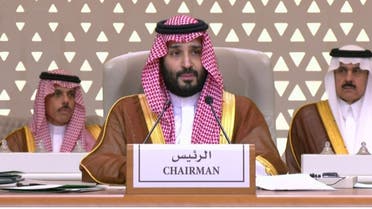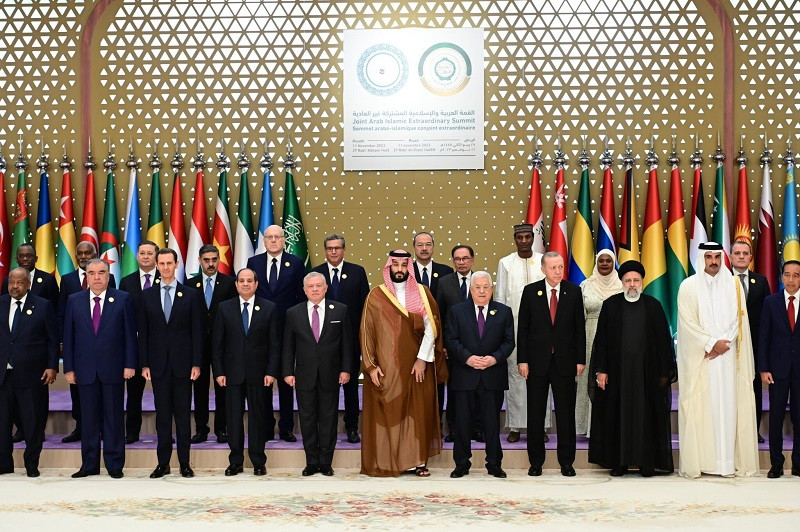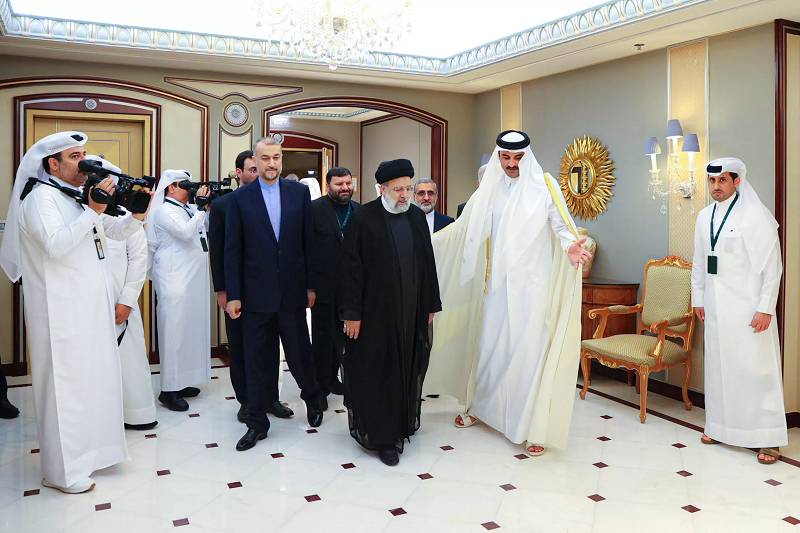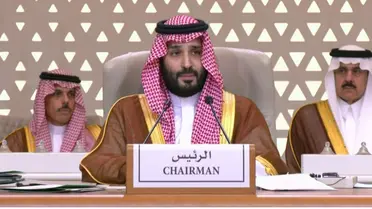
Arab-Islamic summit: MBS says Israel responsible for ‘crimes’ against Gaza civilian
Gaza in spotlight as Arab, Muslim blocs meet in Saudi Arabia
Arab leaders and Iran’s president meet in Saudi for Gaza talks, calls for ceasefire; disagreement on final statement.
Raisi is the first Iranian president to visit Saudi Arabia since Mahmoud Ahmadinejad attended an OIC meeting in the kingdom in 2012.
Arab leaders and Iran’s president gathered in the Saudi capital Saturday for a summit meeting expected to underscore demands that fighting in Gaza end before the Israel-Hamas war draws in other countries.
The emergency meeting of the Arab League and the Organisation of Islamic Cooperation (OIC) comes after Hamas fighters’ bloody October 7 attacks that Israeli officials say left about 1,200 people dead, mostly civilians, and 239 taken hostage.
Israel’s subsequent aerial and ground offensive has killed more than 11,000 people, also mostly civilians and many of them children, according to the Hamas-run health ministry.
Aid groups have joined pleas for a ceasefire, warning of a humanitarian “catastrophe” in Gaza, where food, water and medicine are in short supply.
The Arab League and the OIC were originally meant to meet separately.
Saudi Crown Prince Mohammed bin Salman reiterated the Kingdom’s call for a ceasefire in Gaza and held Israel responsible for “crimes” against civilians in the besieged enclave.
“We are before a humanitarian catastrophe that [shows] the failure of the UN Security Council and international community,” the Crown Prince said said on Saturday during his opening speech at the extraordinary joint Islamic-Arab summit.
He also called for an “immediate cessation” of military operations in Gaza and for opening humanitarian passages.
He added that “Israeli occupation authorities” bear the responsibility of the crimes committed against civilians in the Gaza Strip.
“Israel’s flagrant violations of international laws must be stopped,” MBS said, as he reaffirmed the Kingdom’s condemnation of the “brutal war” that has claimed the lives of thousands of civilians.
The Crown Prince also called for unified efforts to end the siege on the enclave.
“We must work together to end the siege on Gaza and deliver aid,” he said, adding that the “only solution” to achieve stability in the region is through “ending occupation and settlement [policies].”
“The Palestinian people must be granted their legitimate rights [which include] establishing their independent state.”
Leaders from the GCC and the wider Arab and Muslim world have gathered in Saudi Arabia for crisis talks on the escalating Israel-Gaza conflict.
The emergency meeting comes after Hamas militants’ bloody October 7 attacks that Israeli officials say left about 1,200 people dead and 239 taken hostage.
Israel’s subsequent aerial and ground offensive has killed more than 11,000 people, mostly civilians and many of them children, according to the health ministry in the Hamas-run enclave.
Arab diplomats told AFP the decision to merge the meetings came after Arab League delegations had failed to reach an agreement on a final statement.
Some countries, including Algeria and Lebanon, proposed responding to the devastation in Gaza by threatening to disrupt oil supplies to Israel and its allies as well as severing the economic and diplomatic ties that some Arab League nations have with Israel, the diplomats said.

However, at least three countries — including the United Arab Emirates and Bahrain, which normalised ties with Israel in 2020 — rejected the proposal, according to the diplomats who spoke on condition on anonymity.
Prior to the meeting, Palestinian group Islamic Jihad said it did not “expect anything” to come out of it, criticising Arab leaders for the delay.
“We are not placing our hopes on such meetings, for we have seen their results over many years,” Mohammad al-Hindi, the group’s deputy secretary-general, told a press conference in Beirut.
“The fact that this conference will be held after 35 days (of war) is an indication of its outcomes.”
Host Saudi Arabia “confirms that it holds the occupation (Israeli) authorities responsible for the crimes committed against the Palestinian people,” Crown Prince Mohammed bin Salman, the Gulf kingdom’s de facto ruler, said as the summit began on Saturday.
“We are certain that the only way to guarantee security, peace and stability in the region is to end the occupation, siege and the settlements,” he said of Israel’s actions in Gaza and the occupied West Bank.
Israel and its main backer the United States have so far rebuffed demands for a ceasefire, a position that was expected to draw heavy criticism on Saturday.
“This is not just about Israel-Palestine — this is about what is facilitating Israel to do this, which is basically the United States and the West,” said Saudi analyst Aziz Alghashian.
Raisi in Riyadh

Qatar’s Emir Sheikh Tamim bin Hamad Al-Thani (2ndR) alongside Iran’s President Ebrahim Raisi and Foreign Minister Hossein Amir-Abdollahian in Riyadh. PHOTO: AFP
Iran’s President Ebrahim Raisi arrived in Riyadh on Saturday for the summit, his first Saudi trip since the two countries agreed to restore ties in March.
Raisi is the first Iranian president to visit Saudi Arabia since Mahmoud Ahmadinejad attended an OIC meeting in the kingdom in 2012.
Iran backs Hamas as well as Lebanon’s Hezbollah and Yemen’s Huthi rebels, placing it at the centre of concerns the war could expand.
The conflict has already fuelled cross-border exchanges between the Israeli army and Hezbollah, and the Huthis have claimed responsibility for “ballistic missiles” the rebels said targeted southern Israel.
Analysts say Saudi Arabia feels vulnerable to potential attacks because of its close ties with Washington and the fact that it was considering normalising ties with Israel before the war broke out.
Prince Mohammed on Friday condemned “continued violations of international humanitarian law by the Israeli occupation forces,” his first public comments on the war, though Riyadh has levelled similar criticism in multiple statements.
Kim Ghattas, author of a book on the Iran-Saudi rivalry, said during a panel organised by the Arab Gulf States Institute in Washington that “the Saudis are hoping that the fact they didn’t normalise yet, and the fact that they have a channel to the Iranians, gives them some protection.”
And, she added, “the Iranians are hoping that the fact that they’re in touch with the Saudis and maintaining that channel, that it gives them some protection too.”
Caretaker Prime Minister Anwaarul Haq Kakar attends summit
On Friday, Caretaker Prime Minister Anwaarul Haq Kakar arrived in Saudi Arabia’s capital Riyadh to represent Pakistan at the emergency meeting of the Organisation of Islamic Cooperation (OIC) on the situation in Gaza.
Deputy Governor Riyadh Prince Mohammed bin Abdulrahman bin Abdulaziz received the prime minister on his arrival at the King Khalid International Airport earlier in the day. Pakistan’s ambassador Ahmed Farooq and senior Saudi and Pakistani officials were also present.
During his three-day official visit, the prime minister will participate in the emergency meeting being held in Riyadh, which will discuss the Israeli aggression on Gaza.

